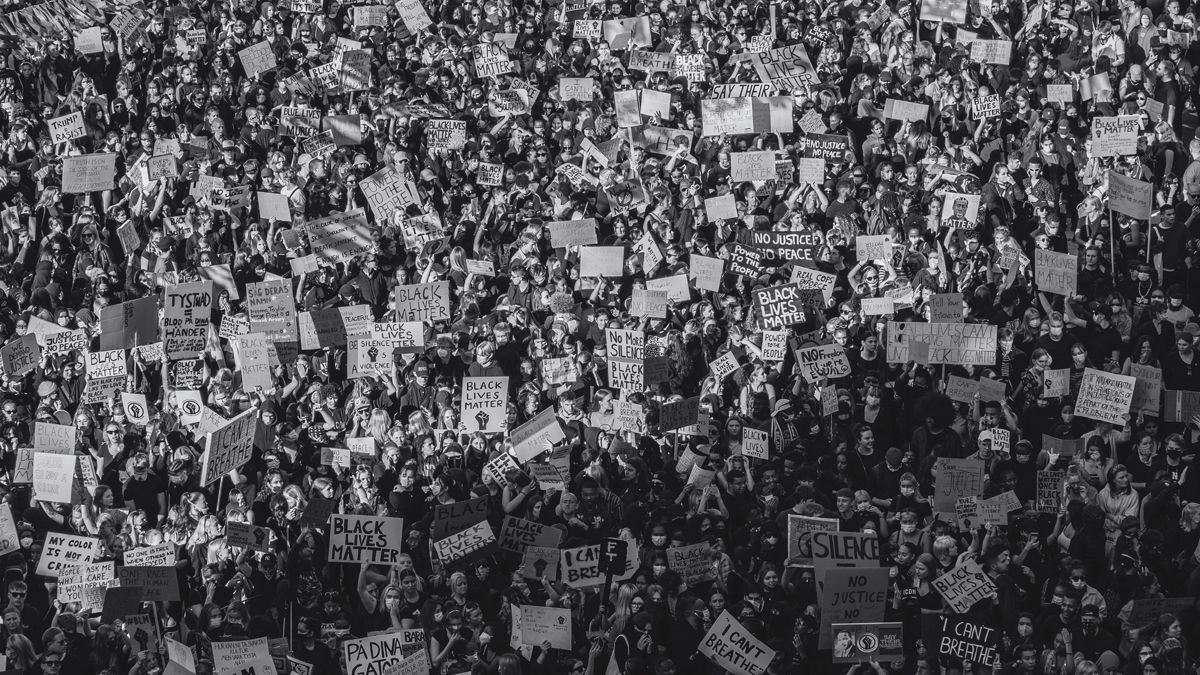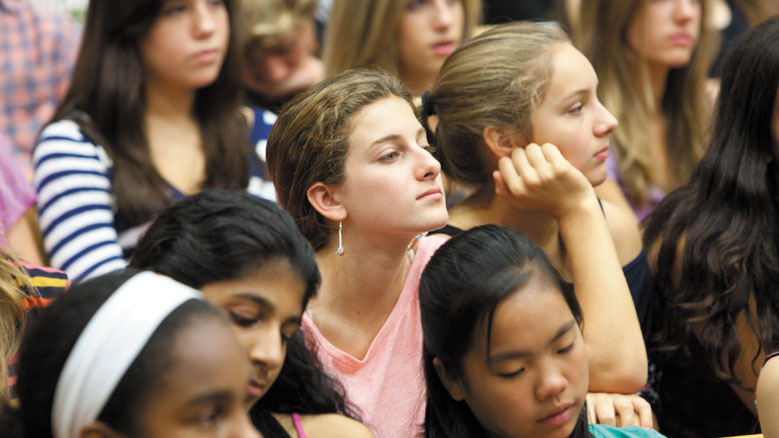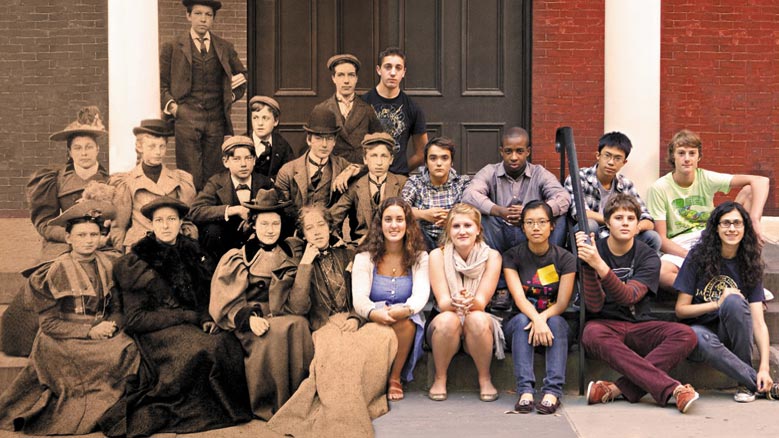A substantial portion of members of the Religious Society of Friends likes to proclaim its liberalism; some Friends even wrap themselves in the mantle of radicals. So perhaps an essay on class privilege and schools should begin with a question about how our traditional testimonies relate to a concrete modern problem: Should Quakers reside in gated communities? True, that query has almost nothing to do with schools, but it has lots to do with social class. And schools and class are certainly related, even if usually not considered together.
I once got to know a Quaker couple, active in their meeting, who in another context explained that they did not lock their doors when they left to go, say, shopping or visiting a neighbor on the other side of town, even at night. I thought: "Now, there’s a fine example of two Quakers who know the right place for material things." Two or three months later it came out, in a tangential sort of way, that they had bought their house in a gated community. So much for those exemplars of Quaker rectitude, thought I, processing this new information.
With this little background in mind, we are in a better position to reflect on Friends meetings’ sacrificial support for private schools. Like the couple mentioned above, Quaker schools become a curious anomaly in this observer’s eyes. Private schools might be understandable if Quakers were sacrificing to educate their own children; instead they scrounge and dig and borrow and beg to build endowments to maintain buildings and pay teachers to teach other people’s children, mostly children of the rich and famous. Who else, after all, could afford, without heavy financial aid, up to $20,000 annually for their kids to go to school?
I know that questioning Quaker schools places me in a distinct minority among my fellow Friends; some might even see me as a detractor, but I regard Friends schools as a major liability, essentially refuges for children of the welloff and the well-to-do of whatever religious faith or none. They can be seen as rough equivalents to the sentinels standing guard at gated communities.
Education at the primary and secondary levels has at least a twofold purpose: One is to provide a solid and full grounding in areas of life that produce meaning and achievement for the individual: literature, history, mathematics, science, the arts, and physical well-being. Few—including this retired teacher— would gainsay the value of this type of education. Not only would I not deny its value in these areas, I applaud and support it—for every child, not just scions of the well-off few.
But education, particularly private education, has another purpose, one less spoken of and hence, among most Friends, seldom discussed. Even among those who wear their liberalism or radicalism out front for all to see, there is little talk of class privilege. Education, especially private education, is a way that the current generation not only offers its youth a solid and full grounding that produces success but also assures that its young people’s educational experience will enable them to assume future leadership roles in every area of activity. Private education is a means through which the current generation’s leaders, political (witness the Presidential first family with two children at Sidwell Friends School in Washington, D.C.), social, and economic, perpetuate their status and assure that it is passed along to a future generation. A "guarded education" —might we even term it "gated"?—in this context takes on an entirely different meaning from that intended by earlier Friends; it might shock them.
Let’s see what it does.
Private education is associated with a high level of quality instruction, grants access to a wide variety of cultural benefits, and allows students to rub elbows with likely mates—one of the stated reasons that most Friends schools lagged behind even public schools in refusing to desegregate. Ironically the headmaster of Sidwell Friends, the school the Obama girls now attend, offered this as his main reason for opposing opening Sidwell’s doors to African American students in the 1930s. (I am indebted to Fit for Freedom, Not for Friendship for this bit of intelligence, which adds to the irony, especially in light of the enrollment of the Obama girls at that school.) It also usually assures admission to elite, often private, universities, where the same conditions presumably apply.
A student who enjoys such advantages easily comes to assume that the world outside the classroom resembles the world inside it. It is a privileged, jaundiced view, to say the least. The benefits of such an education come to be associated with the kind of clothes one wears, the exotic shoreline where one spends a vacation, at what office in what highrise a person’s parents work—how many working-class children can attend a high school that charges a minimum of $20,000 an academic year?—even how one pronounces "tomato." One doesn’t have to lock one’s door when there’s a guard at the gate.
Quakers of early times might have made a reasonable, even spirit-based, case for a "guarded education," one that was separated from the broader world. In those long-ago times, in the 18th and 19th centuries, Quakers usually lived in small, mostly rural communities in which they were often the only religious group. The education they provided for their youngsters was one that taught the things necessary for success in an essentially agrarian society, one that no longer exists. In 1669, George Fox made it clear that Quaker schools should also include girls so they could be instructed in "whatsoever things was civil and useful."
The essence of my complaint against the parochial schools that Friends have sacrificially erected is that they conflict with the democratic values that lie near the heart of Quakerism. In the middle of the 17th century, during a time of revolutionary ferment and upheaval, George Fox and the earliest Friends took careful aim at the privileges and pretensions of the wealthy and well-to-do. These early Quakers refused to take their hats off to honor their betters— they were not better, Friends announced by this action; they were the same. They used the singular thee and thou to everyone rather than the more grandiose plural you, a pronoun that the best people, including royalty, demanded to hear from their "inferiors."
Even more fundamental than these gestures, irritating as they were, was the central message of the earliest Friends’ religious appeal: because Christ could be found inwardly by each individual, there was no need for a set-aside clergy, a special order of trained men, to mediate divine grace. There was no need of sacraments, special hallowed places to worship, or outward symbols. Each person, regardless of race, gender, educational attainment, age, or wealth, stood equal before God and was obligated to proclaim the message that he or she had been given.
In a society marked by privilege, as 17th-century England was, and as ours remains if in a different way, this gospel was a tremendous and startling message of practical liberation. Here were no abstractions that had to be learned in school. Indeed, this good news gave hope to people who had little and promised them a brighter future. Its proclamation goes far in explaining why Quakerism captured the high ground during the English Revolution and was the only sect of nearly countless others of that era to survive until the present. It bespoke a group of people bent on revitalizing what Pennsylvania’s founder William Penn denominated as primitive Christianity. Quakers may have been a smallish group, but they proclaimed a powerful and appealing message.
This is not the place to explore what the plethora of Quaker schools and the modern world’s celebration of Quaker education say about the differences between today’s Quakers and those of the past, although I venture that they recount volumes.
Still, it seems clear that our decision to educate the children of "the rich, the wise, and the wellborn," to use the aristocratic and non-Quaker Alexander Hamilton’s words when, in the 1790s, he described his ideal base of a society, demonstrates a dramatic shift in priorities over the years.
We modern Quakers could take action if we decided to. We might conclude by shutting our schoolhouse doors, selling off our assets, and devoting them to educating those who really need our attention, the weak, the poor, those with hope but few resources. Each former Quaker school could thus endeavor to become a public school with the quality of its previous self. Or we might keep the doors open, capping the number of well-off parents we serve, but swing them wider by subsidizing the attendance of those who now attend public schools. Or there may be solutions that this observer has not even thought of.
One idea I know well, however, is that we will not come up with solutions until we recognize the existence of that pink and mostly uncommented-on elephant in our meeting rooms, the one labeled "class privilege." We need modern Friends to look critically at our institutions and to ask questions about what they see. To what end do we exercise control over the buildings bequeathed to us from the past, for example? Where should we site a new meetinghouse: in an affluent area or in a neighborhood in transition racially? What does a schoolhouse and those who enter it daily say about the goals of our Friends meeting?
I became a convinced Friend because I experienced the reality of God’s Spirit in a meeting for worship among the people of God, "in derision called Quakers," to use a 17th-century description. I got a glimpse there of what the world might be: one in which we all sat equally before God, in which artificial differences among human beings had been obliterated by the Divine Presence, and in which we each were called upon to offer our separate but valued contribution.
I’m enough of a historian to know that institutions often fall short of their ideals, sometimes even subverting their goals; the Religious Society of Friends can claim no exemption from this truth. But I also know that it accepts the "crackpot notion" that God’s truth was not concluded in the first century, or the 17th century. Hence just because we’ve had Quaker schools since the 18th century doesn’t mean that we have to have them forever into the future. The future is ours if we seize it. Let’s see to it that we make sure our future reflects who we claim to be and that we operate as democratically as our announced values proclaim.
There’s a discussion among Friends, and others, about whether we ought to use an old patriarchal, archaic phrase like "Kingdom of God" to describe the society we would like to see and can work for. Let’s leave that dispute aside as unworthy of our attention, and try to unite around the goal of creating a society where each person is given the opportunity, regardless of race, religion, gender, or class, to be truly equal to all others. It may not be a "kingdom," but it will be a community that is divinely established and reflects what this observer believes is the Divine Will. Then we can expect human beings to be what the earliest Friends named "the people of God"—not necessarily called Quakers, but, at least, inspired by them. Along the way we just might decide to eschew private schools, not to mention gated communities, both of which I believe God calls us to forego.




